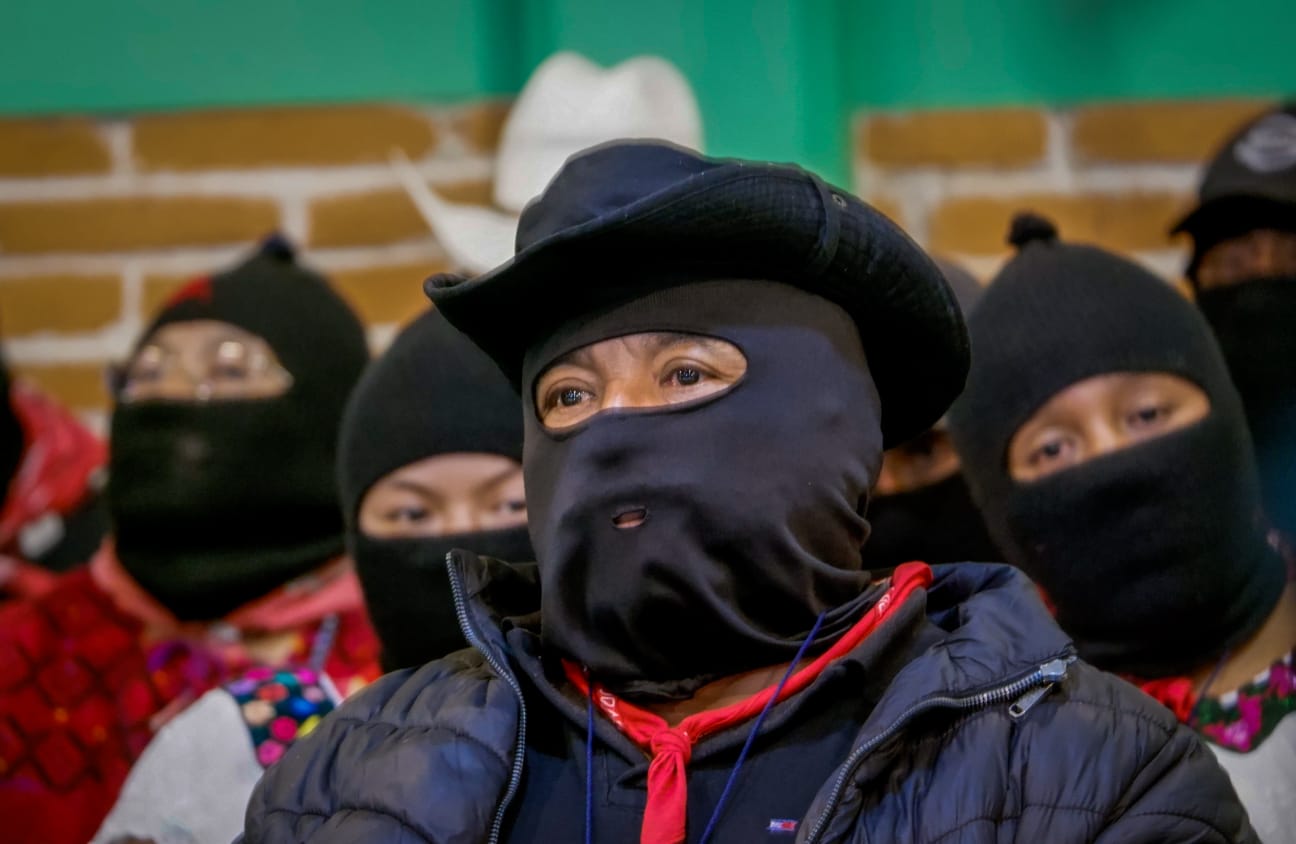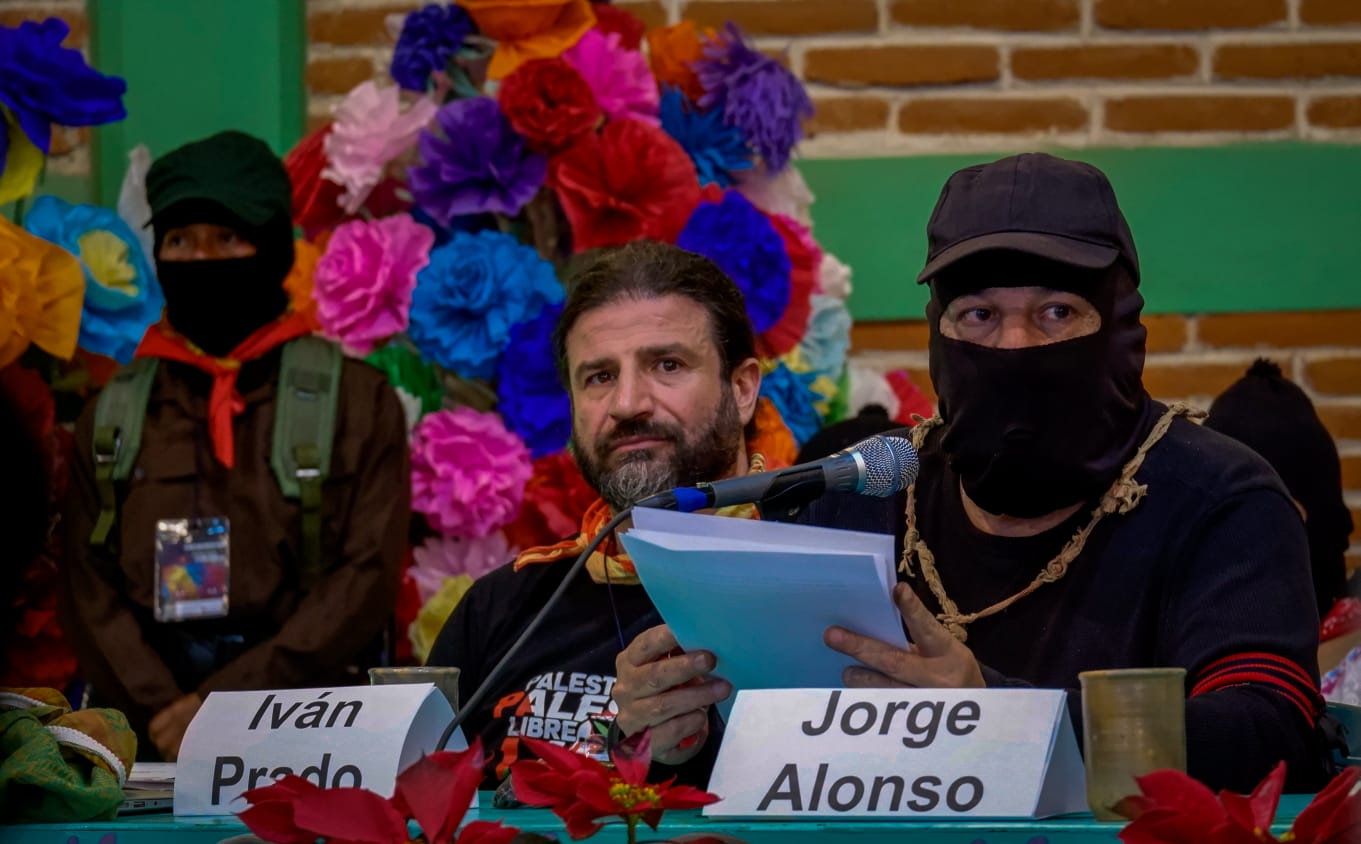Finding ourselves in the Zapatista Commons
Editorial Desinformémonos
Photos by Johana Utrera
The first part of the celebrations for the 31st anniversary of the start of the Zapatista uprising came to a close at the Cideci-Unitierra in San Cristóbal de Las Casas, around 2 p.m. on December 30. For three days, the Zapatista Army of National Liberation (EZLN) demonstrated, once again, its organizational strength, not only by welcoming almost a thousand people from Mexico and the world and the same number of support bases to the International Meeting of Resistance and Rebellion, but also by allowing those who could not get here to listen to the different discussion panels via live streaming.
To get a real idea of what was said, it is certainly more interesting to go to Enlace Zapatista and watch and listen to the videos of the Tercios Compas than to read my lines. However, if the whirlwind of time does not give you the opportunity to do so now, perhaps what I am going to write will help you make the effort to listen directly.
Let's put it this way: up to this point, for those who know, follow and see what has moved the EZLN since January 1, 1994, nothing new. The organization is the strength of a history that for 31 years has resisted against everything and everyone, it is the extra march that has allowed them, in the desperation of poverty and abandonment, to decide to take up arms to claim the right to live, it is what has turned what was seen as madness, which is a revolutionary indigenous guerrilla, into a change in the history of Mexico and the world.

There is no one who cannot admit that January 1, 1994 was a stroke of magical madness and that since that day the word indigenous has changed color throughout the world. Many things have happened in 31 years, but even here there is no detractor who cannot say that the EZLN has remained stagnant, immobile, fossilized in its positions, imperfection has been elevated to value, error to practice, correction to method. The fear of making a mistake was transformed into the opportunity to understand what was wrong, take the time to analyze it and start over with a new proposal. And so we come to today, looking for what to do the next day, with political analysis mixed with practice, practice trying to become a concept, but not universal and universalist but local and particular.
The Zapatistas do not want to teach but to tell, they do not want to show a path but to share how they are preparing for the “day after.” And for this they have studied and traveled. Perhaps, today, with a little more certainty, we can say that the “European tour” of 2021 was a moment of study and observation of the world, a space and a moment to see how in a part of the world that has shown solidarity with the women and men of corn, capitalism subsumes lives, hegemonizes social systems, etc. The Commons is a proposal for peace, a collaborative proposal, an idea that not only questions one of the bases of capitalism, private property, but also proposes to the indigenous and peasant populations attacked by the factionalist, controlling and speculative logic of the different governments, including and especially the current one, to turn back the clock of history to the times when the fields and spaces of the communities were collective spaces and fields, where collaboration took precedence over self-interest and privilege.
Programs like Sembrando Vida, which the EZLN prefers to call Sembrando Muerte, fuel division and confrontation within communities, corrupt peasant history, and use urban concepts, such as the provision of economies, to alter the socioeconomic relations of the territory. The Común and the reorganization of Zapatista autonomy are inserted, it seems, because when speaking of Zapatismo, doubt must always prevail, especially if the person trying to understand is a man, white, Italian, in a broader reflection that also involves relations with non-Zapatista realities, with comrades on the road, with suffering, with violence, but also and above all comrades in struggle.

Captain Marcos said at the end of his speech that closed the third day of meetings: «Next year, in June, is the 20th anniversary of the sixth declaration, which comes from that, it comes from everyone telling their story, this is who I am, this is what I want, this is what I don't want. Now we want, we can count on millions of people around the world who say 'we don't want this world'. And then it is where everyone proposes. The basic thing, the common thing that we have found in what they propose is that it not be the same. That it not be the same because this is what led us and this also has a material basis which is private property. Well, I am not going to go into the horrors of the system because we have already been depressed enough by the members that we invited again, even though they don't know how to speak Spanish. The desperation before 94 was the crossroads between death and death, that is, choosing the way to die. The declaration for life is in front of the crossroads of history, repeating what has already been done or risking something else. That's it, are we going to risk doing something else or not?
The history and present of Zapatismo, of indigenous cosmogony, come into contact again, and thus in a public and open way the comrades of the organization called EZLN have entered a new stage in the history of this revolution, a stage made of new collaborations, openness, dialogue, and that breaks logics, which today would be called colonialist, and thus the Captain says: "we are very different, we can aspire to hegemonize and recruit each other, it is useless, it is not worth it and we do not want that world, we do not want a homogeneous world." A phase that has gone through the hard questioning of the last years of political and social life, of facing errors and observing and listening to the communities in resistance, and with them also the transformations of capitalism and the country and how the 4T is in reality, as has been told in great detail, a capitalist reorganization of the country.
By questioning themselves as the “center” of a world organization, the Zapatistas propose themselves, once again, as a bridge, so that the differences and divisions of the past, in Chiapas, in Mexico, in the world, are dissolved in a kind of recomposition far removed from the hegemonic logic that has too often infested the movements, that starts from below, from suffering and needs, that frames the enemy, capitalism, and stirs the intelligence of those who, not only dreaming, work to build the world we want.

I close again with the Captain’s words, the words that made me understand what I understood and wrote: “And I know that what you are doing is worth gold, but others need to see it, others need to hear it and ask you any questions you may have. Just as it took you a year to try to understand what the commons are and until the compas came to explain to you this is what we think the commons are. When the compas talk about the commons they don’t say we have to do this, they are saying we are doing this, what about you? They are just going to come up with something else, they are citizens, they are from the puddle or from South America or from Africa, wherever each one is and they know and understand their territory and recognize it as a space of struggle because if not they would not be here, if they recognized their space as a space of pain, death, destruction they would only not be here nor would they be watching the broadcast, they would be on the Mayan Train or in Cancun, or I don’t know where, but let it not be cold, right? So if you are here it is because your space is not only one of pain but also of dignified rage, that is, of rebellion and resistance, that is, it is going to touch you. I warn you to prepare yourselves and I ask you to prepare that, to prepare the other side in today's presentations. Yes, there is all this shit but there is this other thing and I am sure that people from outside, that is, those who are not included in this "we" that we say includes you, maybe will not follow any of your proposals, but maybe they will come up with another one that is not contemplated in all our struggles because ours is fundamentally that of indigenous peoples and we have a certain moral authority to invite you to listen to us but we are not recruiting you, God forbid, that is why you are behind this. No, we are recognizing a place for you, what I invite you is to recognize yourselves your place, you have it, you have been laid to rest, whatever it may be, whether it is in art, whether it is in gender organization, whether it is in productive, collective work, all that.

No comments:
Post a Comment